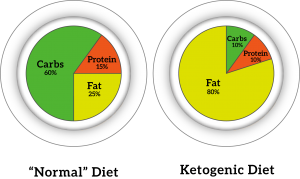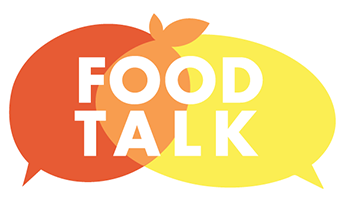The ketogenic diet is taking Georgia and other states by storm. Don’t be fooled by ketogenic diet advice you read on social media or hear from your coworker who just went “keto.” Let’s look at the facts.
About the ketogenic diet
The ketogenic diet is a low-carbohydrate, high-fat diet. Carbohydrates are a macronutrient found in food items like:
- Fruit
- Bread
- Pasta
- Sweets
- Dairy products
Carbohydrates are usually the main source of fuel or energy that your body uses to function. By reducing your carbohydrates to a very low level, your body can go into a state called “ketosis.” During ketosis, your body begins using fat more than carbohydrates for fuel.
On a “normal” diet, experts recommend getting most of your calories in a day from carbohydrates. An example of a “normal” diet plate is on the left. On this plate, 60% of your calories are coming from carbohydrates.

If you follow a ketogenic diet, the majority of your calories in a day must come from fat. Carbohydrates are restricted to just 10% of your daily calories. That’s a small amount! Fat makes up a whopping 80% of your calories on the ketogenic diet plate.
This diet, under a doctor’s supervision, has traditionally been used to help children have less seizures.[1]More recently, fans of the diet claim it helps people lose weight.
Does the ketogenic diet really help people lose weight?
Some studies have found the diet may help with short-term weight loss.[2]However, it takes years of research and much more than a few studies to see the long-term effects of a diet. Right now there are simply not enough research studies available to say for certain whether the ketogenic diet helps with weight loss.[3]
The weight loss in some of those studies may not even be because the body was in ketosis. One study of a low-carbohydrate diet and another study of a ketogenic diet found that the weight loss appeared to be from eating less calories overall, not eating less carbohydrates.[4][5]
People following these diets also had more health problems during the study than other participants. The health issues included constipation, headache, muscle cramps, diarrhea,5and even death.4
Should I follow a ketogenic diet?
There is always a red flag when you limit or cut out an entire macronutrient, such as carbohydrates. It is important to replace what you cut out with another food source that provides the same nutrition. Otherwise, you could become deficient in certain nutrients. A low-carbohydrate diet limits healthy carbohydrates that are full of good nutrition, such as:
- Fruits
- Starchy vegetables
- Whole wheat bread

A strict diet like this is also difficult to follow long-term3,4 and could impact other medical conditions you might have. Please consult your doctor before starting a restrictive or extreme diet.
Safer ways to lose weight include:
- Replacing higher calorie foods (such as chips) with lower-calorie foods (such as fruits and vegetables)
- Eating smaller portion sizes
- Following exercise recommendations
- Swapping out your dairy products for the low-fat or skim version
- Limiting fried foods
Next time you see a diet that claims it can help you lose weight, think of how safe it is, and whether or not you’ll be cutting out important food groups. Now that you know the facts, you won’t be a fool for the ketogenic diet.
Written by Taylor Newman, PhD/DI student | Edited by Laurel Sanville, MS, RDN, LD
Banana original photo source
[1] Ketogenic diet


